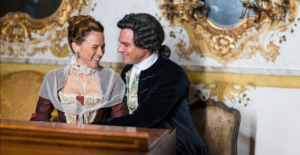Gloria!
Best First-Time Director – Italia
Best Score Composers – Italia
Best Original Song – Italia
2024

FR EN
À l’aube du XIXe siècle, en Vénétie, un orphelinat qui accueille uniquement des femmes abandonnées ou marginalisées est choisi par le nouveau Pape Pie VII pour une visite officielle. Tandis que le maestro et prêtre de l’Institut Sant’Ignazio doit, dans l’angoisse la plus totale, composer quelque chose pour l’occasion, la muette et mélomane Teresa découvre un instrument révolutionnaire dans les sous-sols du bâtiment : un pianoforte.
Réalisé par Margherita Vicario dont c’est le premier long-métrage derrière la caméra, « Gloria! » est avant tout un film historique. L’intrigue se déroule dans un institut pour orphelines comme il en existait tant du XVe siècle à l’époque napoléonienne, où des centaines de musiciennes et de compositrices vivaient et travaillaient avec de nombreux artistes (parmi lesquels Antonio Vivaldi), dans l’ombre de figures masculines et des autorités religieuses qui les méprisaient. Le film est donc, en toute logique, féministe : il traite de l’infatigable lutte des femmes pour leur émancipation, ici à travers leurs qualités de musiciennes.
Car « Gloria! » est surtout et incontestablement un film musical. La bande originale, entièrement composée par la réalisatrice et Davide Pavanello, constitue la véritable colonne vertébrale du long-métrage. La musique nous berce, nous accompagne, nous raconte, du début à la fin, et elle a la particularité d’être incroyablement variée : l’intrigue joue en effet avec beaucoup d’anachronismes mélodiques (bienvenus), faisant vivre en même temps le classique, la pop et le jazz, comme si les émotions et les chansons étaient universelles et intemporelles. En naît alors une symphonie, une ode à la liberté féminine et artistique face au conservatisme catholique et masculin.
Et les actrices incarnent parfaitement ce désir d’émancipation, notamment la Franco-Italienne Galatéa Bellugi (« Chien de la casse » ; « La Passion de Dodin Bouffant ») qui tient le rôle principal. Nous regretterons simplement un léger manque de profondeur de certains personnages, dû toutefois à la concentration de l’histoire non sur les protagonistes mais sur leur affranchissement permis par leur talent musical. « Gloria! » forme ainsi un film entêtant qui donne de l’espoir à toutes celles (et à tous ceux) qui rêvent d’échapper aux carcans d’une société souvent asphyxiante, encore aujourd’hui.
{English below & Italiano alla fine}
At the dawn of the 19th century, in the Veneto region, an orphanage that takes in only homeless or marginalized women is chosen by the new Pope Pius VII for an official visit. While the maestro and priest of the Sant’Ignazio Institute must, in utter anguish, compose something for the event, the mute and music-loving Teresa discovers a revolutionary instrument in the building’s basement: a pianoforte.
Directed by Margherita Vicario, making her feature debut, “Gloria!” is first and foremost a historical picture. The plot takes place in an institute for orphaned girls, as so many existed from the 15th century to the Napoleonic era, where hundreds of female musicians and composers lived and worked with many different artists (including Antonio Vivaldi), in the shadow of male figures and religious authorities who despised them. The film is therefore, quite logically, deliberately feminist: it deals with the tireless struggle of women for emancipation, here through their qualities as musicians.
After all, “Gloria!” is first and foremost a musical film. The soundtrack, composed entirely by the director herself and Davide Pavanello, is the true backbone of the film. The music guides us, takes us along, tells the story, from beginning to end, and has the particularity of being incredibly varied: the plot plays with a lot of melodic (and relevant) anachronisms, bringing classical, pop and jazz to life at the same time, as if the emotions and songs were universal and timeless. The result is a symphony, an ode to feminine and artistic freedom in the face of Catholic and male conservatism.
And the actresses perfectly embody this desire for emancipation, especially the Franco-Italian Galatéa Bellugi (“Junkyard Dog”; “The Taste of Things”) in the lead role. We can only regret a mild lack of depth for some of the characters, due nonetheless to the story’s focus not on the protagonists but rather on their empowerment, enabled by their musical talent. “Gloria!” is a spirited film that gives hope to all those who dream of escaping the shackles of an often suffocating society, even today
All’alba dell’Ottocento, nel Veneto, un orfanotrofio che accoglie unicamente donne abbandonate o marginalizzate è scelto dal nuovo Papa Pio VII per una visita ufficiale. Mentre il maestro e prete dell’Istituto Sant’Ignazio deve, in ansia totale, comporre qualcosa per l’occasione, la muta e melomane Teresa scopre uno strumento musicale rivoluzionario nelle cantine dell’edificio: un pianoforte.
Diretto da Margherita Vicario di cui è il primo lungometraggio, «Gloria!» è innanzitutto un film storico. L’intreccio si svolge in un istituto per orfane come ne esistevano tanti dal Quattrocento all’era napoleonica, dove centinaia di musiciste e compositrici vivevano e collaboravano con numerosi artisti (fra cui Antonio Vivaldi), all’ombra di figure maschili e delle autorità religiose che le disprezzavano. Il film è quindi, naturalmente, femminista: tratta dell’infaticabile lotta delle donne per la loro emancipazione, qui tramite le loro qualità di musiciste.
Perché «Gloria!» è soprattutto e incontestabilmente un film musicale. La colonna sonora, interamente composta dalla regista e Davide Pavanello, costituisce la vera e propria spina dorsale del lungometraggio. La musica ci culla, ci accompagna, ci racconta, dall’inizio alla fine, e ha la particolarità di essere incredibilmente variata: l’intreccio gioca in effetti con parecchi (e benvenuti) anacronismi melodici, facendo vivere contemporaneamente classico, pop e jazz, come se le emozioni e le canzoni fossero universali ed atemporali. Sorge allora una sinfonia, un’oda alla libertà femminile e artistica di fronte al conservatorismo cattolico e maschile.
E le attrice incarnano perfettamente questo desiderio di emancipazione, in particolar modo la franco-italiana Galatéa Bellugi («Chien de la casse»; «Il gusto delle cose») che tiene il ruolo principale. Rammaricheremo soltanto una lieve mancanza di profondezza di alcuni personaggi, dovuta tuttavia alla concentrazione della storia non sulle protagoniste ma sul loro affrancamento permesso dal loro talento musicale. «Gloria!» forma così un film inebriante che dà speranza a tutte quelle (e quelli) che sognano di scappare dalle catene di una società spesso soffocante, ancora oggi.
Axel Chevalier
(Traduzione di A.C.)

